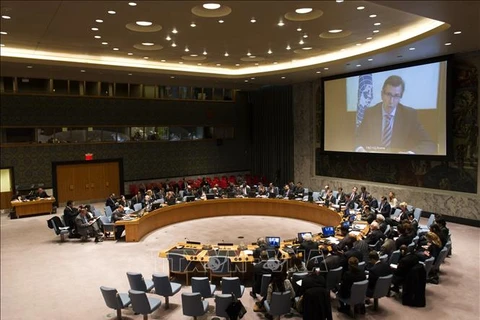Jakarta (VNA) – The International Monetary Fund (IMF) has predicted that Indonesia’s GDP growth may contract by 1.5 percent in 2020 rather than 0.3 percent as it initially forecasted in June this year due to impacts of COVID-19 pandemic.
In its October update of the World Economic Outlook that was released on October 13, the IMF noted that the Indonesian economy remains unstable due to the spreading of the pandemic, which has posed adverse impacts on many sectors, including tourism.
All emerging market and developing economy regions are expected to contract this year, including notably emerging Asia, where large economies, such as India and Indonesia, continue to try to bring the pandemic under control, said the report.
Indonesia has been struggling to contain the outbreak in the country as COVID-19 cases reached 340,622 with more than 12,000 deaths as of October 13. The country has been adding around 3,000 to 4,000 cases daily since September 19.
Indonesia’s GDP was down 5.32 percent year-on-year in the second quarter due to falling household spending and investment, with economists and government officials projecting another contraction in the third quarter, which would mark a recession.
The global economy, meanwhile, is expected to shrink by 4.4 percent this year, a less severe contraction compared to the IMF’s previous estimate of 4.9 percent, due to better-than-expected second-quarter GDP data in countries where activity began to improve after lockdowns and signs of rapid recovery in the third quarter.
The pandemic will reverse the progress made since the 1990s in reducing global poverty and will increase inequality, as the IMF expects nearly 90 million people to fall into poverty this year, according to IMF economic counsellor Gita Gopinath.
The IMF expects the global economy to rebound and grow by 5.2 percent in 2021, while Indonesia’s economy is expected to expand by 6.1 percent.
According to Indonesian Finance Ministry’s Fiscal Policy Agency director for state budget policy, Ubaidi Socheh Hamidi, the Indonesian government’s efforts to contain the pandemic and extended fiscal support will help boost economic growth to 5 percent in 2021./.
In its October update of the World Economic Outlook that was released on October 13, the IMF noted that the Indonesian economy remains unstable due to the spreading of the pandemic, which has posed adverse impacts on many sectors, including tourism.
All emerging market and developing economy regions are expected to contract this year, including notably emerging Asia, where large economies, such as India and Indonesia, continue to try to bring the pandemic under control, said the report.
Indonesia has been struggling to contain the outbreak in the country as COVID-19 cases reached 340,622 with more than 12,000 deaths as of October 13. The country has been adding around 3,000 to 4,000 cases daily since September 19.
Indonesia’s GDP was down 5.32 percent year-on-year in the second quarter due to falling household spending and investment, with economists and government officials projecting another contraction in the third quarter, which would mark a recession.
The global economy, meanwhile, is expected to shrink by 4.4 percent this year, a less severe contraction compared to the IMF’s previous estimate of 4.9 percent, due to better-than-expected second-quarter GDP data in countries where activity began to improve after lockdowns and signs of rapid recovery in the third quarter.
The pandemic will reverse the progress made since the 1990s in reducing global poverty and will increase inequality, as the IMF expects nearly 90 million people to fall into poverty this year, according to IMF economic counsellor Gita Gopinath.
The IMF expects the global economy to rebound and grow by 5.2 percent in 2021, while Indonesia’s economy is expected to expand by 6.1 percent.
According to Indonesian Finance Ministry’s Fiscal Policy Agency director for state budget policy, Ubaidi Socheh Hamidi, the Indonesian government’s efforts to contain the pandemic and extended fiscal support will help boost economic growth to 5 percent in 2021./.
VNA























